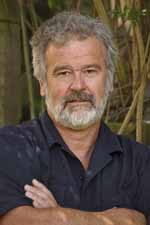 A Charles Sturt University (CSU) lecturer and researcher says his new book about the fifth NSW colonial governor tries to go beyond the standard 'Father of Australia' profiles that might arise in the bicentennial year of the start of Lachlan Macquarie’s 12-year administration (1810-1821).
A Charles Sturt University (CSU) lecturer and researcher says his new book about the fifth NSW colonial governor tries to go beyond the standard 'Father of Australia' profiles that might arise in the bicentennial year of the start of Lachlan Macquarie’s 12-year administration (1810-1821).The book, Macquarie: From Colony to Country, is co-authored by Mr Harry Dillon, a journalism lecturer at the CSU School of Communication and Creative Industries, and Mr Peter Butler, a former lecturer at the School.
Mr Dillon says, “It's important to note that this is a popular history biography, not a book for specialist historians. From the start, the goal was to publish a book that would inform general readers about Governor Macquarie, and our co-author roles were distinct: I wrote the manuscript and Peter carried out research, administrative work and acquisition of the illustrations.
“Our book emphasises the immense difficulties Macquarie faced in an odd and fractious community that was halfway between an outdoor jail and a germinal colony of free settlement.
“The conventional, popular story of Macquarie that is being told and re-told this year is true as far as it goes but does not really convey the full extent of his achievement in very difficult circumstances.
“The story tends to highlight that Macquarie extended settlement of the colony after the 1808 rebellion, sorted out Sydney's roads and built new turnpikes, established a string of new townships, created Sydney's first substantial public buildings, and was benevolent towards all classes, especially convicts and ex-convicts.
“The real story is actually more dramatic and compelling because Macquarie also encountered great problems with the indifferent and parsimonious Colonial Office in London, and locally with 'exclusive' settlers and officials who opposed his policies, especially his generosity and clemency towards the downtrodden.
“The conventional story says little at all about the how and why of Macquarie's term in office, which saw the population of the colony grow from 10 000 to 40 000; Why did he adopt policies that caused him major problems in the latter years of his governorship? What motivated his determination to build the rudiments of civilisation in the shoddy NSW colony that hardly rated a mention in the corridors of power in London?
“I think the answers lie to some extent in his upbringing in the dying days of the old clans in the Inner Hebrides of Scotland, and also in his 30 years of service, mostly overseas, as a British army officer. However, he also seems to have had an inherently humane approach towards anyone in difficulty, combined with an immense desire to make a positive mark in the world that goes beyond any of the conditions of his life.





Social
Explore the world of social